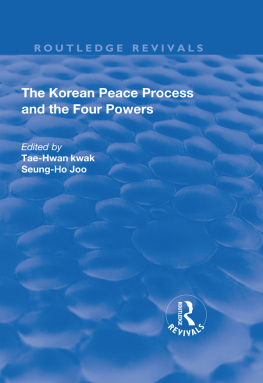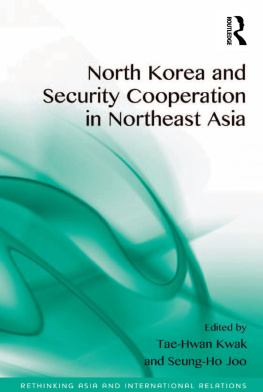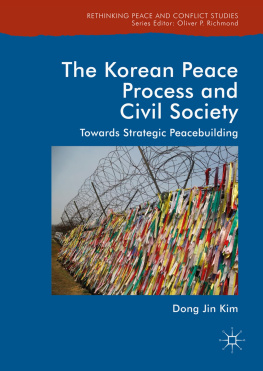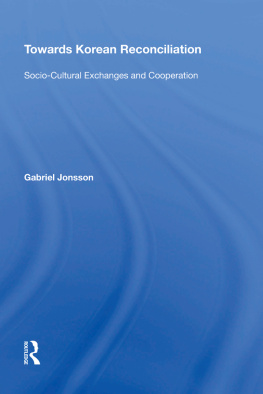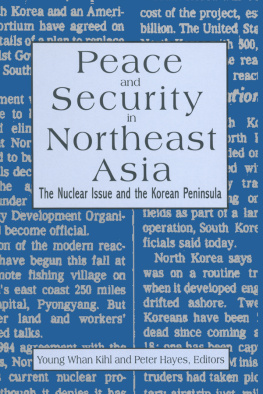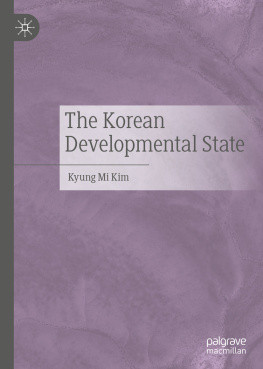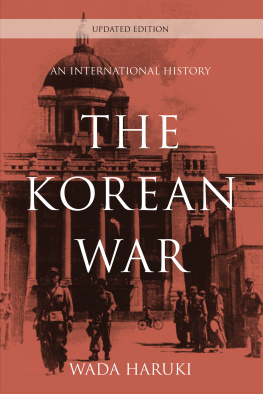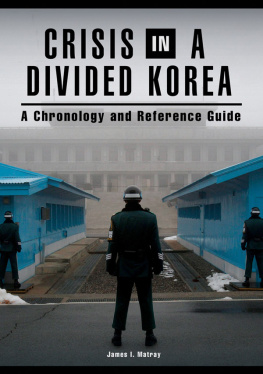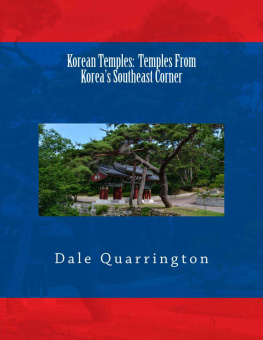First published 2003 by Ashgate Publishing
Reissued 2018 by Routledge
2 Park Square, Milton Park, Abingdon, Oxon OX14 4RN
711 Third Avenue, New York, NY 10017, USA
Routledge is an imprint of the Taylor & Francis Group, an informa business
Copyright Tae-Hwan Kwak and Seung-Ho Joo 2003
Tae-Hwan Kwak and Seung-Ho Joo have asserted their right under the Copyright, Designs and Patents Act, 1988, to be identified as editors of this work.
All rights reserved. No part of this book may be reprinted or reproduced or utilised in any form or by any electronic, mechanical, or other means, now known or hereafter invented, including photocopying and recording, or in any information storage or retrieval system, without permission in writing from the publishers.
Notice:
Product or corporate names may be trademarks or registered trademarks, and are used only for identification and explanation without intent to infringe.
Publishers Note
The publisher has gone to great lengths to ensure the quality of this reprint but points out that some imperfections in the original copies may be apparent.
Disclaimer
The publisher has made every effort to trace copyright holders and welcomes correspondence from those they have been unable to contact.
A Library of Congress record exists under LC control number: 2003056082
ISBN 13: 978-1-138-71577-6 (hbk)
ISBN 13: 978-1-315-19737-1 (ebk)
Editors
Tae-Hwan Kwak (Ph.D., Claremont Graduate University) is Professor Emeritus of Government, Eastern Kentucky University; former President of Korea Institute for National Unification (KINU); and former Director of the Institute for Far Eastern Studies, Kyungnam University, Seoul. Dr. Kwak, a specialist in East Asian affairs and international politics, is the author of In Search for Peace and Unification on the Korean Peninsula (1986), and The Korean Peninsula in World Politics (1999, in Korean). He is the editor and co-editor of 23 books, including Korea in the 21st Century (Nova Science, 2001), The Major Powers of Northeast Asia: Seeking Peace and Security (Lynne Rienner, 1996), The Four Powers and Korean Unification Strategies (1997), and The US.-ROK Alliance in Transition (1996). Dr. Kwak has contributed chapters to more than 50 books, and has published more than 150 articles on the problems of Korean unification and four major powers foreign policies toward the Korean peninsula. Dr. Kwak was editor-in-chief, International Journal of Korean Unification Studies and Asian Perspective. His work has appeared in academic journals in the U.S., Germany, China, Russia, Hong Kong, Japan, Taiwan, Great Britain and Korea.
Seung-Ho Joo (Ph.D., The Pennsylvania State University) is Associate Professor of Political Science, University of Minnesota, Morris. He has taught at The Pennsylvania State University, University of Minnesota-Duluth, and Yonsei University (Seoul). His research interest areas include Russian foreign and security policy, Russo-Korean relations, and Korean foreign relations. Dr. Joo is the author of Gorbachevs Foreign Policy Toward the Korean Peninsula, 19851991: Reform and Policy (Edwin Mellen, 2000) and co-editor of Korea in the 21 st Century (Nova Science, 2001). He has authored over 35 book chapters and journal articles, with the latter appearing in Pacific Affairs, World Affairs, Journal of Northeast Asian Studies, American Asian Review, Comparative Strategy, Arms Control, and The Korean Journal of Defense Analysis. He is currently completing a book manuscript on Russia and Korea, 19922003. He is President of the Association of Korean Political Studies.
Contributors
C.S. Eliot Kang (Ph.D., Yale University) is Associate Professor of Political Science, Northern Illinois University. He also studied at Princeton University and received his A.B., summa cum laude , from Cornell University. Dr. Kang has taught at the University of Pennsylvania and was a Research Fellow in the Foreign Policy Studies Program at the Brookings Institution. From June 1997 to July 1998, he was an International Affairs Fellow in Japan of the Council on Foreign Relations and a Visiting Research Fellow at the Japan Institute of International Affairs (JIIA). Dr. Kang is a member of the Council on Foreign Relations and an U.S. national committee member of the Conference on Security Cooperation in Asia Pacific (CSCAP). He has published numerous book chapters and articles in publications such as International Organization, Comparative Strategy and World Affairs.
Yoshinori Kaseda (Ph.D. Candidate, Northern Illinois University) is Assistant Professor of Politics, University of Kitakyushu, Japan. He has taught at Northern Illinois University (NIU) and Miyazaki International College in Japan. He received his B.A. in philosophy from the University of Kumamoto in Japan in 1993 and his M.A. in Political Science from NIU in 1996. He has published a book chapter and articles in journals such as World Affairs, International Journal of Korean Unification Studies and Journal of Political and Military Sociology.
Edward A. Olsen (Ph.D., American University) is Professor of National Security Affairs at the Naval Postgraduate School where he specializes in Northeast Asian politics and security and U.S. relations with Japan and the two Koreas. Formerly (19751980), he served as a political analyst on Japan and Korea at the Department of State, Bureau of Intelligence and Research (INR). He holds a B.A. (History, UCLA), M.A. (East Asian Studies, UC Berkeley), and Ph.D. (International Studies, American University). He is the author of six books and six monographs, and editor of four books. He also is the author of 64 book chapters, 121 journal articles, and 91 op-ed pieces. His most recent books are Normalizing U.S.-Korea Relations, In Due Course? (Lynne Rienner, 2002) and U.S. National Defense for the Twenty First Century: The Grand Exit Strategy (Frank Cass, 2002).
Quansheng Zhao (Ph.D., Berkeley) is Professor and Division Director of Comparative and Regional Studies, the School of International Service of American University, Washington, D.C. He is also Associate-in-Research at the Fairbank Center for East Asian Research of Harvard University. Professor Zhao is author of Interpreting Chinese Foreign Policy (Oxford University Press, winner of Best Academic Publication, by the Ministry of Culture of the Republic of Korea) and Japanese Policymaking (Oxford University Press/Praeger, selected as Outstanding Academic Book by Choice ), editor of Future Trends in East Asian International Relations (Frank Cass), and co-editor of Politics of Divided Nations: China, Korea, Germany, and Vietnam (University of Maryland Law School). He also has had three books published in Chinese, two in Japanese, and one in Korean.

